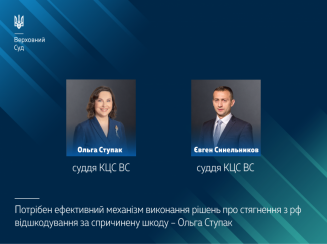Contact center of the Ukrainian Judiciary 044 207-35-46

This was emphasized by Olha Stupak, a judge of the Civil Cassation Court within the Supreme Court, during the presentation of the 2022 Monitoring Report on the Effectiveness of Regulatory Acts in Ukraine, prepared by the Ministry of Justice of Ukraine with the support of the EU Project Pravo-Justice. On February 7, 2023, participants of the event discussed the enforcement of national court decisions in which the Russian Federation was a defendant. Judge of the Civil Cassation Court within the Supreme Court Yevhen Synelnykov also took part in the discussion.
Olha Stupak emphasized the importance of the analysis of international court case law on compensation for damage caused by armed conflicts presented by the authors of the report. She also noted that Supreme Court judgments in cases of compensation for damage caused by the aggression of the Russian Federation in terms of justifying the absence of jurisdictional immunity of the aggressor country took a worthy place among relevant case law in different countries.
The judge drew attention to the resolution of the Civil Cassation Court within the Supreme Court of April 14, 2022, in case No. 308/9708/19. "This decision has put an end to the issue of judicial immunity of the aggressor country and opened the way for national courts to consider cases on recovery of damages caused by Russia," she said. The current procedural legislation, the speaker added, obliges the courts of first and appellate instances to take into account the conclusions of the Supreme Court, which "pushed the issue of limiting the judicial immunity of the aggressor country to the background even without legislative changes."
Therefore, today Olha Stupak sees the primary task of the legislative and executive authorities of Ukraine to focus their efforts on developing an effective mechanism for enforcing court decisions to recover compensation for the damage caused by Russia.
The speaker said that the issue of compensation for the property damage caused by the armed conflict in eastern Ukraine arose as early as 2014. On March 4, 2020, the Civil Cassation Court within the Supreme Court delivered a special ruling in case No. 237/557/18-ц, in which it recommended that the Cabinet of Ministers of Ukraine develop a special procedure for compensation for such damage, a procedure for appropriate payments, etc. Further by Resolution No. 767 of September 2, 2020 "Issues of Payment of Monetary Compensation to Victims Whose Residential Houses (Apartments) Were Destroyed as a Result of a Military Emergency Caused by the Armed Aggression of the Russian Federation", the Cabinet of Ministers of Ukraine set out the new wording of its Resolution No. 947 of December 18, 2013 "On Approval of the Procedure for Providing and Determining the Amount of Financial Assistance to Victims of Emergency Situations Who Remained at the Previous Place of Residence" and defined this procedure. "Today, this mechanism is working. The maximum amount of compensation is UAH 300 thousand," the judge said.
However, she pointed out that under this procedure, Ukraine pays compensation for damaged property in a limited amount. Such a mechanism should be distinguished from the recovery of damages from the aggressor country. The point is that in the first case, we should talk about the enforcement of judgments in cases where the state of Ukraine is the defendant. While in the second case, it is the aggressor country.
Olha Stupak stressed that currently it was important to educate citizens about the advantages and disadvantages of each of the procedures. A claim against the state of Ukraine to recover compensation for property damaged in the result of Russian aggression, if damage is proven, allows for compensation under a clear procedure, but to a limited extent that may not cover all losses. Instead, there are problems with the enforcement of a court decision to recover damages from the aggressor country. "It is necessary to explain to citizens that there is one mechanism by which they can get money guaranteed, and another, less predictable one. So citizens have to choose between a bird in the hand and two in the bush," said Olha Stupak.
She also pointed out that currently Ukrainian legislation did not provide for a clear procedural mechanism for notifying the defendant in cases involving claims for damages against the Russian Federation. This may cause problems with the enforcement of Ukrainian court decisions granting these claims in other countries where the property of the aggressor country is located and can be recovered. Therefore, we need to focus on developing and amending national legislation accordingly.
The speaker is convinced that most disputes of this category will not reach the cassation instance, since if the decision is made in favor of the plaintiff, he will not appeal it. And the defendant, the aggressor country, is also unlikely to take advantage of this procedural opportunity. However, the Supreme Court, when communicating with its colleagues from the appellate and first instance courts, emphasizes that despite this, the standard of proof in such cases cannot be lowered: the relevance and admissibility of evidence must be properly assessed, etc.
In addition, the authors of the report proposed a number of mechanisms to enforce decisions on compensation for damage caused by the armed aggression of the Russian Federation. Olha Stupak remarked that the most promising and effective mechanism to address the enforcement of these court decisions is the administrative one. This is about creating a special fund in Ukraine that would be filled with the support of international partners. Later, the money paid by the fund would be compensated as part of the reparations of the aggressor country or through an international court decision, etc.
"Ukraine alone will not be able to enforce such a number of relevant decisions because there is not so much property of the aggressor country on its territory that can be recovered," said Olha Stupak. That is why, according to her, it is very important to engage in a dialogue with our international partners on the conclusion of relevant international agreements.